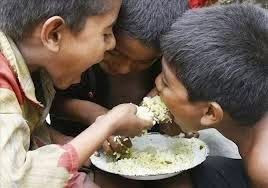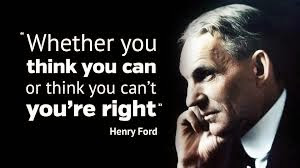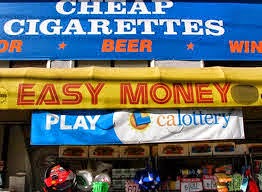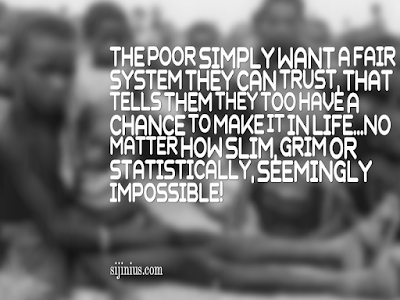 |
| rediff.com |
Have you ever wondered why a poor person will rather invest time on Facebook than invest money in its shares?
The answer is simply rooted in a belief mindset: ‘The belief by the poor that one system is fair and balanced, and gives them a voice- a chance to express themselves and be who they want to be; while the other system is rigged against them, manipulated by the rich, to favour the rich.’
How do I mean?
The psychological chase for recognition
Statistically, poor households (who cannot afford lottery tickets) are the ones who spend the most on the lottery. In the USA, the average household spend $1000 (about N200,000) annually on lottery tickets, and most of these households are poor by national standard.
As mentioned by Professor Shlomo Benartzi in his famous 2012 TED talk, the record is held by Singapore where the average (poor) family spends $4000 (about N800, 000) annually hoping to win the million dollar jackpot.
It is proven statistically that a person has a higher chance of being struck by lightning than of winning the lottery. In fact, the odds of winning the lottery jackpot in UK is 1 in 13,983,816 (approx. 1 in 14 million). In USA, it is about 1 in 259 million.
But why do people still play as if their (success in) life depends on it?
[The point of this article is not to advocate that anyone stop buying lottery tickets/playing lottery (I have been on the hot seat of Who Wants To Be A Millionaire myself- which is a form of lottery), but to help us understand the psychological difference between how a poor person approaches life and how the rich makes decisions.]
To answer the question, we need to understand the psychology behind the actions of the poor. And until we know why they do what they do, we can’t help them change their actions.
The need to belong in the society, and the need to be recognized (what the experts call Marginalisation) is what causes the poor to play the lottery (sometimes with their last penny) believing that therein lies their true chance of ‘making it’ in life. This is far different from why a rich person plays the lottery (if at all they do).
There is an innate psychological need to be valued, loved and wanted in every one of us. However, the poor have a (faulty) mentality that the odds of life –race, family pedigree, country, caste, political circumstance, intelligence, and so on- are stacked against them. (Can you blame them?) And they also believe that the only way to turn the tide in their favour is to find a system that gives them a (seemingly) fair, equal-opportunity, and unbiased chance of succeeding, even if it is a shortcut.
How the poor try to correct the imbalance and fight marginalisation
The poor look at the world and see a global system - banks, political institutions, educational system, etc- put in place for the rich, by the rich, most times, at the expense of the poor. The poor therefore do not see how their efforts (which are a direct result of their mindset) can ever help them overcome poverty, without outside help. And some economists too believe that.
Maybe they are right!
They do not believe or know that most of the world’s richest people today were also born very poor, and worked their way out of poverty. They do not see that their everyday choices and habits are also a direct cause (instead of a consequence) of their poverty, validating and perpetuating it (-the poverty mindset).
They play the lottery hard to find an escape from poverty. But no one escapes poverty physically, who has not being freed mentally.
To believe that having cash is what makes you rich is tantamount to believing that you can't be thirsty because you are at sea!
How do we help them?
The poor person who puts 10 cents or $1 down every day to buy a lottery ticket -believing that they may win the lottery even though that is statistically unlikely, and thinking it is too small, anyway, to help them get out of poverty if they keep it -can also save that same amount. I believe that if people can form poverty-perpetuating habits, they can also be taught to form poverty-liberating habits.
In fact, the poor can (and do) save, even without an automated system, as long as they have faith in the system that collects/keeps their savings; believing that there is a hope and chance to be liberated from poverty thereby.
Once we understand that the underlying need (of the poor) is for a system they can trust, a network/community that they believe values them and gives them a sense of belonging, then, we can effectively reduce (global) poverty.
That is why religion sells more among the poor and downtrodden. It has never been about money, but acceptance.
That is also why the poor quickly praise, endorse and even worship any government or political leader/’messiah’ that listens to them and formulates policies that favour them...even if dictatorial.
THE POOR SIMPLY WANT A FAIR SYSTEM THEY CAN TRUST, THAT TELLS THEM THEY TOO HAVE A CHANCE TO MAKE IT IN LIFE...no matter how slim, grim or statistically, seemingly impossible.
Unfortunately, that is also what fraudsters, Ponzi schemes and ‘get-rich-quick’ schemes use as bait to rob the poor of the little they have. They sell a mindset of “The little you have isn’t enough, so why bother keeping it. Give it to us and we will give you a better chance of making it big in life.”
Maybe that is the ‘lie’ the poor love to hear, because every decade we keep seeing people fall prey to 419/Ponzi schemes.
That is why the rich build networks and nourish good relationships (-why they form cooperative societies), but the poor are alone!
No man is an island. If you want to impoverish a man, separate him from people that can help him. And if you want to enrich a man, bring him in contact with people that can help him.
FOR THE POOR, IT REALLY ISN’T ABOUT THE LOTTERY, OR TAX, OR SAVINGS, OR EVEN POVERTY!
IT IS ABOUT THEIR DREAMS AND FINANCIAL GOALS...AND THEIR SENSE OF WORTH AND BELONGING IN BEING ABLE TO ACHIEVE THEM.



No comments:
Post a Comment